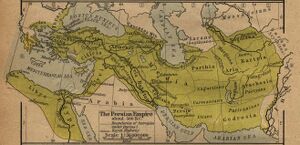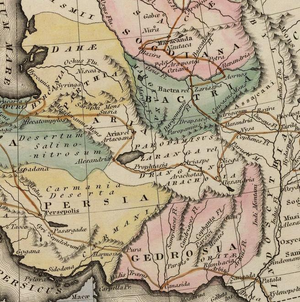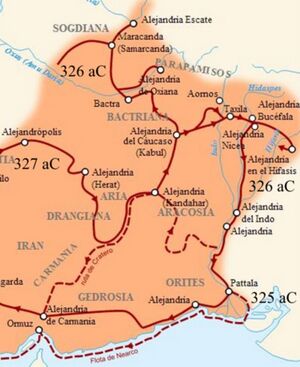Gedrosia
| Author:Laxman Burdak, IFS (Retd.) |



Gedrosia is the hellenized name of an area that corresponds to today's Balochistan. It may be identified with modern Gwadar in Pakistan. According to Arrian[1] the capital of Gedrosia was town named Pura.
Variants of name
Location
The area which is named Gedrosia, in books about Alexander the Great and his successors, runs from the Indus River to the southern edge of the Strait of Hormuz. It is directly to the south of the Iranian countries of Bactria, Arachosia and Drangiana, to the east of the Iranian countries of Persia and Carmania and due west of the Indus River which formed a natural boundary between it and Western India.
Jat clan
- Gadar
- Gidar will appear again among tribes of Balochistan, as Gidor and Gadara, representatives of the ancient Gedrosai of the Greeks.[2]
- Ora
History
Following his army's refusal to continue marching east at the Hyphasis River in 325 BC, Alexander the Great crossed the area after sailing south to the coast of the Indian Ocean on his way back to Babylon. Upon reaching the Ocean, Alexander the Great divided his forces in half, sending half back by sea to Susa under the command of Nearchus.[3] The other half of his army was to accompany him on a march through the Gedrosian desert, inland from the ocean.[4] Throughout the 60 day march through the desert, Alexander lost at least 12,000 soldiers, in addition to countless livestock, camp followers, and most of his baggage train.[5] Some historians say he lost three-quarters of his army to the harsh desert conditions along the way.[6] However, this figure was likely based on exaggerated numbers in his forces prior to the march, which were likely in the range of no less than 30,000 soldiers.[7]
There are two competing theories for the purpose of Alexander the Great's decision to march through the desert rather than along the more hospitable coast. The first argues that this was an attempt to punish his men for their refusal to continue eastward at the Hyphasis River.[8] The other argues that Alexander was attempting to imitate and succeed in the actions of Cyrus the Great, who had failed to cross the desert.[9] The decision to cross the Gedrosian Desert, whatever his intentions, is regarded as the largest blunder in Alexander the Great's Asiatic campaign.
Ch.xxii. March of Alexander through the desert of Gadrosia.
Arrian[10] writes ...AGAIN he took half of the shield-bearing guards and Agrianians, the guard of cavalry and the horse-bowmen, and marched forward to the confines of the Gadrosians and Oritians, where he was informed that the passage was narrow, and the Oritians were drawn up with the Gadrosians and were encamping in front of the pass, with the purpose of barring Alexander’s passage. They had indeed marshalled themselves there; but when it was reported that he was already approaching, most of them fled from the pass, deserting their guard. The chiefs of the Oritians, however, came to him, offering to surrender both themselves and their nation. He instructed these to collect the multitude of their people together and send them to their own abodes, since they were not about to suffer any harm. Over these people he placed Apollophanes as viceroy, and with him he left Leonnatus the confidential body-guard in Ora,1 at the head of all the Agrianians, some of the bowmen and cavalry, and the rest of the Grecian mercenary infantry and cavalry. He instructed him to wait until the fleet had sailed round the land, to colonize the city,2 and to regulate the affairs of the Oritians ~ that they might pay the greater respect to the viceroy. He himself, with the main body of the army (for Hephaestion had arrived at the head of the men who had been left behind), advanced into the land of the Gadrosians by a route most of which was desert. Aristobulus says that in this desert many myrrh-trees grew, larger than the ordinary kind; and that the Phoenicians, who accompanied the army for trafficking, gathered the gum of myrrh, and loading the beasts of burden, carried it away.3 For there was a great quantity of it, inasmuch as it exuded from large stems and had never before been gathered. He also says that this desert produces many odoriferous roots of nard,1 which the Phoenicians likewise gathered; but much of it was trampled down by the army, and a sweet perfume was diffused far and wide over the land by the trampling; so great was the abundance of it. In the desert there were also other kinds of trees, one of which had foliage like that of the bay-tree, and grew in places washed by the waves of the sea. These trees were on ground which was left dry by the ebb-tide; but when the water advanced they looked as if they had grown in the sea. Of others the roots were always washed by the sea, because they grew in hollow places, from which the water did not retire; and yet the trees were not destroyed by the sea. Some of these trees in this region were even thirty cubits high. At that season they happened to be in bloom ; and the flower was very much like the white violet,5 but the perfume was far superior to that of the latter. There was also another thorny stalk growing out of the earth, the thorn on which was so strong that, piercing the clothes of some men just riding past, it would pull the horseman down from his horse rather than be itself split off the stalk. It is also said that when hares run past these bushes, the thorns cling to their fur; and thus these animals are caught, as birds are with bird-lime, or fish with hooks. However they were easily cut through with steel; and when the thorns are cut the stalk gives forth much juice, still more abundantly than fig-trees do in the springtime, and it is more pungent.’
Ch.xxiii: The march of Alexander through the desert of Gadrosia
Arrian[11] writes ... THENCE Alexander marched through the land of the Gadrosians, by a difficult route, which was also destitute of provisions; and in many places there was no water for the army. Moreover they were compelled to march most of the way by night, and a great distance from the sea. However he was very desirous of coming to the part of the country along the sea, both to see what harbours were there, and to make what preparations he could on his march for the fleet, either by employing his men in digging wells, or by making arrangetnents somewhere for a market and anchorage. But the part of the country of the Gadrosians near the sea was entirely desert. He therefore sent Thoas, son of Mandrodorus, with a few horsemen down to the sea, to reconnoitre and see if there happened to be any haven anywhere near, or whether there was water or any other of the necessaries of life not far from the sea. This man returned and reported that he found some fishermen upon the shore living in stifling huts, which were made by putting together mussel-shells, and the back-bones of fishes were used to form the roofs. He also said that these fishermen used little water, obtaining it with difficulty by scraping away the gravel,’ and that what they got was not at all fresh. When Alexander reached a certain place in Gadrosia, where corn was more abundant, he seized it and placed it upon the beasts of burden; and marking it with his own seal, he ordered it to be conveyed down to the sea. But while he was marching to the halting stage nearest to the sea, the soldiers paying little regard to the seal, the guards made use of the corn themselves, and gave a share of it to those who were especially pinched with hunger. To such a degree were they overcome by their misery that after mature deliberation they resolved to take account of the visible and already impending destruction rather than the danger of incurring the king’s wrath, which was not before their eyes and still remote. When Alexander ascertained the necessity which constrained them so to act, he pardoned those who had done the deed. He himself hastened forward to collect from the land all he could for victualling the army which was sailing round with the fleet; and sent Cretheus the Callatian to convey the supplies to the coast. He also ordered the natives to grind as much corn as they could and convey it down from the interior of the country, together with dates and sheep for sale to the soldiers. Moreover he sent Telephus, one of the confidential Companions, down to another place on the coast with a small quantity of ground corn.
Chapter xxiv. March through Gadrosia.
Arrian[12] writes ... HE then advanced towards the capital of the Gadrosians, which was named Pura ; and he arrived there in sixty days after starting from Ora. Most of the historians of Alexander’s reign assert that all the hardships which his army suffered in Asia were not worthy of comparison with the labours undergone here. They say that Alexander pursued this route, not from ignorance of the difficulty of the journey (Nearchus, indeed, alone says that he was ignorant of it), but because he heard that no one had ever hitherto passed that way with an army and emerged in safety, except Semiramis, when she fled from India. The natives said that even she emerged with only twenty men of her army; and that Cyrus,. son of Cambyses, escaped with only seven of his men. For they say that Cyrus also marched into this region for the purpose of invading India, but that he did not effect his retreat before losing the greater part of his army, from the desert and the other difficulties of this route. When Alexander received this information he is said to have been seized with a desire of excelling Cyrus and Seniiramis. Nearchus says that he turned his march this way, both for this reason and at the same time for the purpose of conveying provisions near the fleet. The scorching heat and lack of water destroyed a great part of the army, and especially the beasts of burden; most of which perished from thirst and some of them even from the depth and heat of the sand, because it had been thoroughly scorched by the sun. For they met with lofty ridges of deep sand, not closely pressed and hardened, but such as received those who stepped upon it just as if they were stepping into mud, or rather into untrodden snow. At the same time too the horses and mules suffered still more, both in going up and coming down the hills, from the unevenness of the road as well as from its instability. The length of the marches between the stages also exceedingly distressed the army; for the lack of water often compelled them to make the marches of unusual length.’ When they travelled by night on a journey which it was necessary to complete, and at daybreak came to water, they suffered no hardship at all; but if, while still on the march, on account of the length of the way, they were caught by the heat, the day advancing, then they did indeed suffer hardships from the blazing sun, being at the same time oppressed by unassuageable thirst.
References
- ↑ Arrian Anabasis Book/6b, Ch.24
- ↑ An Inquiry Into the Ethnography of Afghanistan,p.111
- ↑ [A.B. Bosworth, "Conquest and Empire: The Reign of Alexander the Great." 1988. pg 139]
- ↑ [Ibid, pg. 142]
- ↑ [Ibid, pg 145]
- ↑ Plutarch, The Life of Alexander, 66.
- ↑ [A.B. Bosworth, "Conquest and Empire: The Reign of Alexander the Great." 1988. pg 146]
- ↑ [Waldemar Heckel, "The Wars of Alexander the Great." 2002. pg. 68]
- ↑ [A.B. Bosworth, "Conquest and Empire: The Reign of Alexander the Great." 1988. pg 146]
- ↑ Arrian Anabasis Book/6b, Ch.xxiii
- ↑ Arrian Anabasis Book/6b, Ch.xxiii
- ↑ Arrian Anabasis Book/6b, Ch.xxiv
Back to Jat Places in Pakistan
Back to Jat Places in Pakistan

